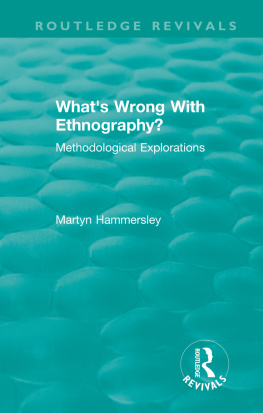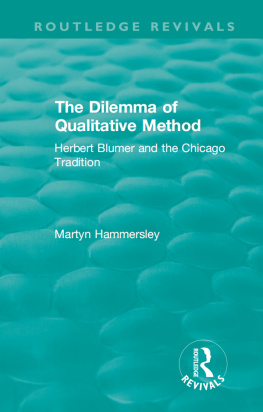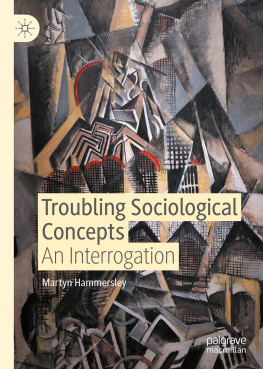Routledge Revivals
Whats Wrong With Ethnography?
Originally published 1992 What's Wrong With Ethnography? provides a fresh look at the rationale for and distinctiveness of ethnographic research in sociology, education and related fields. Relativism, critical theory, the uniqueness of the case study and the distinction between qualitative and quantitative research are all examined and found wanting as a basis for informed ethnography. The policy and political implications of ethnography are a particular focus of attention. The author compels the reader to re-examine some basic methodological assumptions in an exciting way.
Whats Wrong With Ethnography?
Methodological Explorations
By Martyn Hammersley
First published in 1992
by Routledge
This edition first published in 2018 by Routledge
2 Park Square, Milton Park, Abingdon, Oxon, OX14 4RN
and by Routledge
711 Third Avenue, New York, NY 10017
Routledge is an imprint of the Taylor & Francis Group, an informa business
1992 Martyn Hammersley
All rights reserved. No part of this book may be reprinted or reproduced or utilised in any form or by any electronic, mechanical, or other means, now known or hereafter invented, including photocopying and recording, or in any information storage or retrieval system, without permission in writing from the publishers.
Publishers Note
The publisher has gone to great lengths to ensure the quality of this reprint but points out that some imperfections in the original copies may be apparent.
Disclaimer
The publisher has made every effort to trace copyright holders and welcomes correspondence from those they have been unable to contact.
A Library of Congress record exists under LCCN: 91010212
ISBN 13: 978-1-138-48934-9 (hbk)
ISBN 13: 978-1-351-03802-7 (ebk)
Whats Wrong with Ethnography?
Ethnography is today widely used and accepted as an approach to social research, yet it remains controversial. In this stimulating critique, Martyn Hammersley concentrates on the major methodological issues currently facing ethnography. How valid is its claim to represent an independent social reality? What is the link between ethnography and social and political practice? What is its proper relationship to quantitative method? What's Wrong with Ethnography ? provides novel answers to these questions.
Neither endorsing traditional ethnographic thinking nor simply accepting the views of its critics, the author argues that traditional ethnography involves a nave realism that is indefensible but at the same time he rejects the appeal of relativism. Similarly, while insisting that ethnographic findings must be relevant to practical and political issues, he rejects the arguments of advocates of critical and practitioner ethnography. He questions the idea that ethnography represents a distinct epistemological, or even methodological, paradigm, and suggests instead that ethnography should be integrated into the mainstream of social research methodology.
Martyn Hammersley's conclusions have radical implications for ethnography and will challenge and provoke both practitioners of ethnography and their critics. His book is essential reading for anyone with an interest in qualitative research, or indeed in social research methodology generally.
Martyn Hammersley is Senior Lecturer in the School of Education, Open University.
WHAT'S WRONG WITH ETHNOGRAPHY?
Methodological explorations
Martyn Hammersley
First published in 1992
by Routledge
11 New Fetter Lane, London EC4P 4EE
Simultaneously published in the USA and Canada
by Routledge
a division of Routledge, Chapman and Hall Inc.
29 West 35th Street, New York, NY 10001
1992 Martyn Hammersley
Typeset in Baskerville by LaserScript Limited, Mitcham, Surrey
All rights reserved. No part of this book may be reprinted or reproduced or utilized in any form or by any electronic, mechanical, or other means, now known or hereafter invented, including photocopying and recording, or in any information storage or retrieval system, without permission in writing from the publishers.
British Library Cataloguing in Publication Data
Hammersley, Martyn
What's wrong with ethnography?
1. Ethnography
I. Title
306.072
Library of Congress Cataloging in Publication Data
Hammersley, Martyn.
What's wrong with ethnography?/Martyn Hammersley.
p. cm.
Includes bibliographical references and index.
1. Ethnology-Methodology. 2. Ethnology-Research.
3. Ethnology-Philosophy. I. Title.
GN345.H36 1992
305.8-dc20 91-10212
CIP
ISBN 0-415-05476-1
0-415-05477-X (pbk)
Thanks to Barry Cooper, Peter Foster, Roger Gomm, Colin Lacey, Donald Mackinnon, John Scarth, Thomas Schwandt and John K. Smith for comments on or discussions about various of the essays included in this book. Thanks also to Joan, Rachel and Paul, just for being there.
was previously published in a slightly different version in Sociology, 24, 3, pp. 597-617.
is a substantially modified version of 'Making a Vice of our Virtues', which appeared in I.F. Goodson and S.J. Ball (eds) Defining the Curriculum, Lewes, Falmer, 1984.
The author is much obliged to the British Sociological Association and to Falmer Press respectively for permission to reprint these articles.
The title of this collection of essays is ambiguous. Read in one way it might be taken to imply a defiant defence of ethnography (what's wrong with it?). Alternatively, the tide may be interpreted as promising the discussion of some serious problems facing this approach to social research.issues from those that were at the focus of the earlier debates between quantitative and qualitative researchers; though there remains some continuity since a prominent argument in recent criticism is that much ethnography has retained elements of positivism, rather than making a sufficiently radical break with it.
There are two especially salient areas of current criticism. First, there is the issue of representation. To what degree can ethnographic accounts legitimately claim to represent an independent social reality? In the past, much of the argument supporting the value of ethnography in comparison with quantitative method was couched in terms of its greater ability to capture the nature of social phenomena. However, in recent years many have come to question this realist conception of validity, arguing that the data which ethnographers use is a product of their participation in the field rather than a mere reflection of the phenomenon studied, and/or is constructed in and through the process of analysis and the writing of ethnographic accounts. The most obvious example of this anti-realist trend is the growing interest in the rhetorical strategies used by ethnographers, these often being treated as constituting rather than merely representing what they describe (see, for example, Tyler 1985; Clifford and Marcus 1986; Clifford 1988).
Another area where traditional ideas about ethnography are being challenged concerns the relationship between research and practice. In a variety of fields conventional ethnography (along with other forms of social research) has come to be criticised for failing to contribute to practice; whether to political activity, narrowly defined, or to various relevant forms of occupational practice (such as that of policy-makers, administrators of various kinds, social workers and schoolteachers). Examples of such criticism are to be found in the writings of advocates of critical and action ethnography (see, for example, Carr and Kemmis 1986). In arguing that ethnography should have a more direct relationship with practice, perhaps even being integrated with it, such critics raise queries about what the purpose of ethnography is and should be, and how well current ethnographic research serves that purpose. Also arising here are questions about the relationship between facts and values, and between researchers and practitioners. As with anti-realism, this type of criticism has often been presented, not as a rejection of ethnography in favour of some other approach, but rather as capitalising on its strengths or even purging it of extraneous positivist elements. In the course of such












